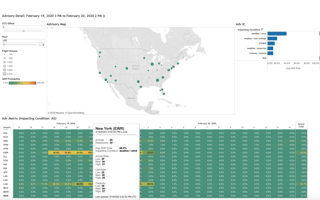Wish there was an API to tell you everything you wanted to know about delays at an airport? Now...
So how are Lumo’s predictions different from Google’s?

When Google announced last year that they were releasing a flight delay prediction feature, we were thrilled! Being the only company that predicted delays was lonely, and we were excited that Google would bring some much-needed attention to a problem we feel strongly about.
Then… not much happened. We continued to do our thing—raising a round of funding led by JetBlue Technology Ventures, rolling out cool new products and features—and didn’t hear much from Google until it was that recently announced that Google assistant would be helping with flight delays. This time the story got a lot more traction, and I’ve been asked by everyone I met how our predictions were different from Google’s, so I decided to write this post.
Nothing about Google’s algorithms is public beyond the two blog posts, so my opinions here are based on best guesses from what we can observe. We ran multiple side-by-side tests to see how Google’s predictions did relative to ours. In general, it appears that there are two key differences:
- While Lumo’s machine learning algorithms take number of factors—weather, air traffic control, network propagation, current delays, history, etc.—into account, Google’s predictions appear to be largely driven by knock-on impacts of current delays (i.e., if flight from A to B is delayed, it is likely to delay the flight from B to C).
- Lumo’s algorithms quantify the magnitude, probability, and cause of a delay (how likely a delay is to occur, how long that delay might be, and what is likely to cause it) while Google’s output seems more limited.
Below are a couple of examples that illustrate the differences. In the first (Southwest 1984), Lumo sees the delay coming 20 hours out, but Google never flags the flight as being at risk. In the second example (American 4891), Lumo sees the delay coming several hours out, and Google flags the risk once the inbound flight is delayed. Both flights were eventually cancelled.
When people now ask me how our predictions compare to Google’s, I say they aren’t really comparable in that a “prediction” means vastly different things to each of us. Google waits for the first domino to fall and then predicts if that will propagate. We solve the harder problem, of predicting which domino will be the first to fall (and why),and predict how likely that is to propagate forward.







